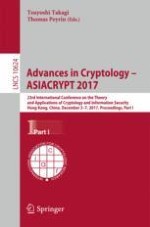2017 | OriginalPaper | Buchkapitel
Adaptive Oblivious Transfer with Access Control from Lattice Assumptions
verfasst von : Benoît Libert, San Ling, Fabrice Mouhartem, Khoa Nguyen, Huaxiong Wang
Erschienen in: Advances in Cryptology – ASIACRYPT 2017
Aktivieren Sie unsere intelligente Suche, um passende Fachinhalte oder Patente zu finden.
Wählen Sie Textabschnitte aus um mit Künstlicher Intelligenz passenden Patente zu finden. powered by
Markieren Sie Textabschnitte, um KI-gestützt weitere passende Inhalte zu finden. powered by
